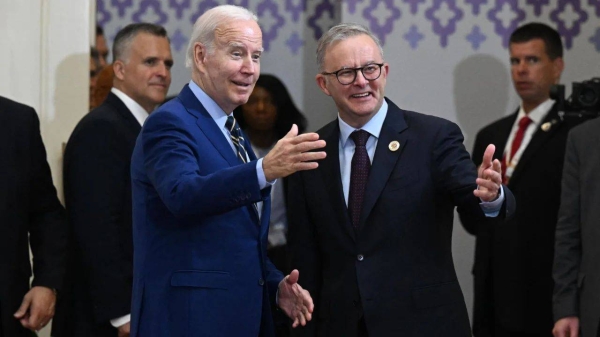
While foreign secretary in 2016, Boris Johnson triumphantly announced that the UK was “back East of Suez” — an indication that post-Brexit “Global Britain” would enhance its role in the Middle East. Five years on and these claims look increasingly spurious. Britain under Prime Minister Johnson, as has been underlined this week, appears chaotic and weak and not in a position to maximize its influence.
Meanwhile, the increased assertiveness of global and regional powers, whether China, Russia, Iran or Saudi Arabia, squeezes the UK’s position even further. The greatest challenge, however, has been the retrenchment of the US, upon which London has relied over recent decades to amplify its power. With Joe Biden continuing this approach, begun by Barack Obama and Donald Trump, Johnson’s vision of increased Middle East influence looks likely to remain a mirage.
The American withdrawal from the Middle East has been somewhat exaggerated. The US remains by far the most powerful external actor in the region, with troop and base numbers that dwarf those of China and Russia, as well as Britain. It retains the economic and military capacity to intervene in most theaters in the region and counts all of the region’s powers except for Iran as allies. Those forecasting an Afghanistan-esque US withdrawal from the Middle East will likely be disappointed. However, it has clearly fallen down the priority list for Washington, with oil lessening in importance and the public deeply against deploying “boots on the ground” after the debacle of Iraq.
Despite hopes that Biden might buck this trend, he seems disinterested. He showed initial urgency in brokering peace deals in Libya and Yemen, but a lack of progress has sapped his team’s enthusiasm. He launched strikes on Iranian positions in Iraq and Syria and intervened with Israel during the 2021 Gaza confrontation, but these were short-term reactions to crises rather than a renewed strategic involvement. Meanwhile, he is rolling back from past US commitments. He is softening his stance on Syrian President Bashar Assad, permitting Jordan and others to bypass certain Trump-era sanctions. Recent challenges to democracy in Tunisia and Sudan have been met with strong words but no real action or sanctions, a far cry from past US democracy-promotion efforts. The exception is the Iranian nuclear negotiations, which Biden seems determined to pursue, despite slow progress. Beyond this, however, the Middle East takes up little bandwidth for the Biden administration, whose priorities are its domestic agenda and a foreign policy that focuses on China and Russia.
Despite British diplomats’ best efforts, the country’s credibility under Johnson is limited and London is lacking soft power.
Christopher Phillips
So, where does this leave the UK? London shares many of Washington’s positions. It too was burned by a domestic backlash against Iraq and has mimicked its close ally’s preference for a foreign policy “tilt toward” Asia. In the wake of Brexit, the UK hopes to stick even closer to the US, having burned its bridges with European allies. It might, therefore, make sense to follow Washington’s lead and lessen its interest in the Middle East.
However, despite accusations that London is simply Washington’s “poodle,” it retains independent interests in the region and the costs of abandoning these could prove great. It would also go against Johnson’s promises of how Brexit would make Britain more influential, not less. Indeed, “thriving relationships in the Middle East” were part of the Global Britain strategy outlined in the 2021 Integrated Review. These include important commercial and military ties to the Gulf and deep relationships with long-standing allies like Jordan and Oman. There are broader security concerns as well. While the region is physically distant from the US, it is proximate to the UK, meaning London has been directly impacted by refugee flows and terror attacks linked to instability in the Middle East.
The challenge for the UK is how to protect or even enhance those interests without an active and engaged US. One option might have been to lean instead on European partners in areas of common interest. While this continues to be pursued in preexisting areas of European cooperation like the Iran talks, the hostility of the Johnson government toward the EU has made an expansion into new areas unlikely for now.
Another tack might be to enhance and deepen its ties to Middle Eastern allies, like the UAE and Saudi Arabia, leveraging the UK’s military and diplomatic assets in areas of mutual benefit. Again, despite British diplomats’ best efforts, the country’s credibility under Johnson is limited and lacking in some of the soft power that would help expand on such ties.
Despite their historical closeness, the UK lacks the influence to persuade the US to engage more in the Middle East. Security crises like the rise of Daesh in 2014 will still bring the US, and the UK, back but, beyond this, London needs to develop long-term strategies to cope with a disengaged US.
If it still dreams of influence “East of Suez,” one option might be to seek out European or Middle Eastern partners in a limited number of selected common issue areas. However, for all his triumphalism, Johnson’s policies and blunders make this difficult. In the meantime, London will likely tread water: Reacting to key events, such as the outbreak of conflicts and the showdown with Iran, but not developing anything approaching a regional strategy. This is something that will likely have to wait until post-Johnson — an era that actually may not be that far away.
Christopher Phillips is professor of international relations at Queen Mary University of London and author of “The Battle for Syria” and co-editor of “What next for Britain in the Middle East?” Twitter: @cjophillips
Disclaimer: Views expressed by writers in this section are their own and do not necessarily reflect Arab News" point-of-view












